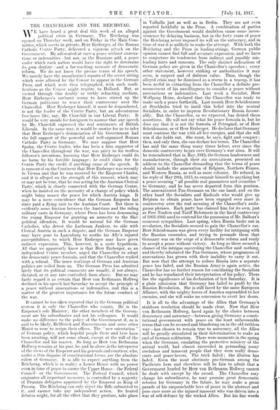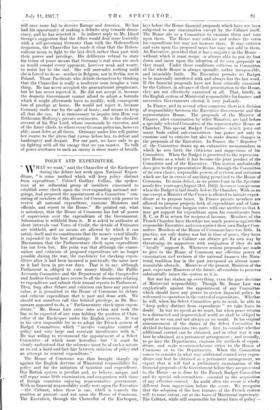THE CHANCELLOR AND THE REICHSTAG.
WE have heard a great deal this week of an alleged political crisis in Germany. The Reichstag was opened on Thursday week, and on Friday in the Main Com- mittee, which meets in private, Herr Erzberger, of the Roman Catholic Centre Party, delivered a vigorous attack on the Government. He advocated at once a peace without annexa- tions or indemnities—but not, as the Russians add, a peace -under which each nation would have the right to determine its pwn destiny—and a far-reaching measure of democratic reform. We do not know the precise terms of his speech. We merely have the unauthorizei reports of the secret sitting which were allowed by the Censor to appear in the German Press, and which were then telegraphed, with such modi- fications as the Censor might require, to Holland. But, as viewed through this doubly or trebly refracting medium, Herr Erzberger's outburst seems to have stirred up the German politicians to renew their controversy over the Chancellor. Herr Erzberger himself, it must be remembered, is not the leader of the 'Centre Party, but an adventurous free-lance like, say, Mr. Churchill in our Liberal Party. It would be very unsafe for foreigners to assume that any speech by Mr. Churchill expressed the real sentiments of British Liberals. In the same way, it would be unwise for us to infer that Herr Erzberger's denunciation of his Government had the full support of the powerful and well-organized Roman Catholic Party in Germany. We may suppose that -Herr Spahn, the Centre leader, who has been a firm supporter of the Chancellor throughout the war, was privy to his restless follower's intentions, knowing that Herr Erzberger could do no harm by his forcible language ; he could claim for the Centre Party the credit if anything came of the speech. It is rumoured on the Continent that Herr Erzberger was recently in Vienna and that he was received by the Emperor Charles, and it is alleged on the strength of this rumour, which may or may not be true, that he was acting for the Austrian Clerical Party, which is closely connected with the German Centre, when he insisted on the necessity of a change of policy which might bring nearer the peace for which Austria longs. It may be a mere coincidence that the German Emperor has since paid a flying visit to the Austrian Court. But there is evidently some friction between the Austrians and the ruling military caste in Germany, whose Press has been denouncing the young Emperor for granting an amnesty to the Slav political offenders. It would be natural for the German Catholics, who detest the Lutheran Junkers, to side with Clerical Austria in such a dispute, and the German Emperor may have gone to Laxenburg to soothe his Ally's injured susceptibilities, to which Herr Erzberger may have given indirect expression. This, however, is a mere hypothesis. All that we apparently know is that Herr Erzberger, as an independent Centre member, urged the Chancellor to adopt the democratic peace formula, and that the Chancellor replied with a refusal. The inner workings of German and Austrian politics are veiled from us. The German Press has admitted lately that its political comments are usually, if not always, dictated, or at any rate controlled, from above. But we may fairly regard it as certain that Herr. von Bethmann Hollweg declined in his speech last Saturday to accept the principle of a peace without annexations or indemnities, and this is a matter of the greatest importance for the future conduct of the war.
It cannot be too often repeated that in the German political system it is only the Chancellor who counts. He is the Emperor's sole Minister ; the other members of the Govern- ment are his subordinates and not his colleagues. It would make no difference to the policy of the Government if, as is said to be likely, Helfierich and Zimmermann and some other Ministers were to resign their offices. The new orientation " of German policy, which hopeful people there and here have been awaiting, will not come about, except at the will of the Chancellor and his master. So lone. as Herr von Bethmanu Hollweg remains at his post, he, and alone, is the interpreter of the views of the Emperor and.his generals and courtiers, who, under a thin disguise of constitutional forms, are the absolute rulers of Germany. It is idle to expect anything from the Reichstag, which is in reality a Lower House with no power even in time of peace to coerce the Upper House—the Federal Council--or the Government. The Federal Council, which originates all important measures. is controlled by a majority of Prussian delegates appointed by the Emperor as King of Prussia. The Reichstag can only reject the Bills submitted to it, and cannot take any independent action. Its heated debates might, for all the effect that they produce, take place in Valhalla just as well as in Berlin. They are not even reported faithfully in the Press. A combination of parties against the Government would doubtless cause some incon- venience by delaying business, but in the forty years of peace the Reichstag never imposed its will on the autocracy, and in time of war it is unlikely to make the attempt. With both the Reichstag and the Press in leading-strings, German public opinion cannot find full and accurate expression, and we have to conjecture its tendencies from indirect and possibly mis- leading hints and rumours. The only distinct indications of German policy are given in the Chancellor's speeches ; every other statement, however striking or authoritative it may seem, is suspect and of dubious value. Thus, though the alleged crisis may be dismissed as a storm in a teacup, it has been useful in extracting from the Chancellor a definite pro- nouncement of his unwillingness to consider a peace without annexations or indemnities. Last week a Socialist, Herr Wolfgang Heine, declared that the Chancellor was ready to make such a peace forthwith. Last month Herr Scheidemann at Stockholm tried to instil this belief into the neutral Socialists, in order to impress Revolutionary Russia favour- ably. But the Chancellor, as we expected, has denied these assertions. He will not say what his peace formula is, but he does say that it is not the formula of Petrograd, or of Herr Scheidemann, or of Herr Erzberger. He declares that Germany must continue the war with all her energies, and that she will win if she holds out. She must, he says, fight and conquer ; then, and only then, she can declare her terms. The Chancellor has said the same thing many times before, ever since the domestic controversy began over Germany's war aims. It will be remembered that in May, 1915, the German landowners and manufacturers, through their six associations, presented an address to the Chancellor demanding that the terms of peace should include the annexation of Belgium, Northern France, and Western Russia, as well as more colonies. He refused, in his reply of May 28th, 1915, to commit himself to anything but a peace securing " all possible real guarantees and securities " to Germany, and ho has never departed from this position. The annexationist Pan-Germans on the one hand, and on the other hand the Socialists and Radicals who would give up Belgium to obtain peace, have been engaged ever since in controversy over the real meaning of the Chancellor's ambi- guous phrases. Each party has claimed him for its own, just as Free Traders and Tariff Reformers in the fiscal controversy of 1903-1905 used to contend for the possession of Mr. Balfour's economic sympathies. Last spring, when Russia broke out in revolution, the Socialists seemed to gain the Chancellor's ear. Herr Scheidemann was given every facility for intriguing with the Russian comrades, and trying to persuade them that Germany was on the verge of a democratic reform and ready to accept a peace without victory. As long as there seemed a chance of the intrigue succeeding the Chancellor said nothing, and thereby infuriated the Pan-Germans, whose programme of annexations has grown with their inability to carry it out. But now that the attempt to seduce Russia into a separate peace has failed, and the Russian Army is again active, the Chancellor has no further reason for conciliating the Socialists and he has repudiated their interpretation of his policy. There lies the significance of his declaration of last Saturday. It is a plain admission that Germany has failed to profit by the Russian Revolution. She is still faced by the same European Alliance, with the mighty forces of America superadded to her enemies, and she will make no concession to avert her doom.
It is all to the advantage of the Allies that Germany's stubborn resolution should be made clear. Now that Herr yen Bethmann Hollweg, faced again by the choice between democracy and autocracy—between giving Germany a consti- tutional government with peace on the least unfavourable terms that can be secured and blundering on in the old ruthless way—has chosen to remain true to autocracy, all the Allies will be greatly stimulated in-their determination to make an end of German militarism. There were moments in the spring when the Germans, emulating the protective mimicry of the animal world, had almost succeeded in persuading many credulous and innocent people that they were really demo- crats and peace-lovers. The trick failed ; the illusion has faded. Even the most obstinate pro-German among the Pacificists here and elsewhere will be fain to admit that a Government headed by Herr von Bethmann Hollweg cannot- be dealt with except by the sword. The Chancellor may change his subordinates, he may promise great democratic reforms for Germany in the future, he may make a great parade of his unquenchable love of peace in the abstract and pose once more as the injured innocent who was driven into a war of self-defence by the wicked Allies. But his fine words
Will once more fail to deceive Europe and America. He has had his opportunity of making a definite step towards demo- cracy, and ho has rejected it. In indirect reply to Mr. Lloyd George's suggestion that the Allies would deal more leniently with a self-governing Germany than with the Hohenzollern despotism, the Chancellor has made it clear that the Hohen- zollerns mean to fight to the last ditch rather than part with their power and privilege. His deliberate refusal to state his terms of peace means that Germany's real aims are such as would compel every opponent, however weak and weary, to resist her to the end. She will surrender nothing until she is forced to do so—neither in Belgium, nor in Serbia, nor in Poland. Those Pacificists who delude themselves by thinking that the Chancellor is really a moderate man imagine a vain thing. He has never accepted the annexationist proms amme, but he has never rejected it. He did not accept it, because the despotic Government cannot afford to adopt a formula which it might afterwards have to modify, with consequent loss of prestige at home. He would not reject it, because Germany made war for the sake of booty, and means to keep all that she can. It is unnecessary to inquire into Herr von Bethmann Hollweg's private sentiments. He is the obedient servant of his War Lord, whose commands he executes, and of the Army chiefs, to whom every German politician, however able, must defer at all times. Germany under him will pursue her course to the abyss that yawns before her, to defeat and bankruptcy and despair. For our part, we have only to go on fighting with all the energy that we can muster. To talk of peace overtures to such an enemy is sheer waste of breath.



























 Previous page
Previous page